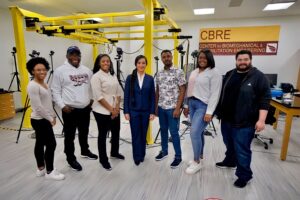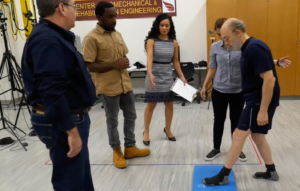
Alan T. Waterman awardee helps open doors for minorities in STEM
Alan T. Waterman awardee helps open doors for minorities in STEM

Dr. Lara Thompson in the Center for Biomechanical & Rehabilitation Engineering (CBRE) mobility lab with students.
Brought on board in the fall of 2013 to establish UDC’s now ABET-accredited biomedical engineering program and to create a new research facility tied to biomedical engineering, Dr. Lara Thompson has also created research opportunities for students. In addition, she helped secure more than $21 million in STEM grants for UDC. Thompson is the first principal investigator faculty member of an HBCU to receive the National Science Foundation’s prestigious Alan T. Waterman award—the nation’s top honor for early career scientists and engineers in 2022. Since the award’s inception in 1975, Thompson is also the first self-identified female of color recipient.
“There were several past awardees and nominees from really large institutions with faculty from all over the country,” she said. “I am still surprised and honored.”
Thompson is an associate professor of mechanical engineering and is the founding director of the Biomedical Engineering Program, the first and only ABET-accredited Bachelor of Science in Biomedical Engineering Program at a HBCU. She also leads the Center for Biomechanical & Rehabilitation Engineering (CBRE) at UDC, a state-of-the-art research facility focused on human mobility.
“There is a lot of untapped potential. We want to get the word out about this program and the opportunities that UDC has to offer students.” Thompson said.
She earned her Bachelor of Science degree in Mechanical Engineering from the University of Massachusetts Lowell in 2003, followed by a Master of Science degree in Aeronautical and Astronautical Engineering from Stanford University in 2005. Thompson also earned a Ph.D. from the Harvard-MIT Division of Health Sciences and Technology (HST) in Biomedical Engineering in 2013. Her doctoral research was the first to demonstrate that a vestibular-based sensory prosthesis can improve the ability to maintain balance during head-turns.
Born in Boston, Thompson grew up in southern New Hampshire. She has worked for more than two years at Charles Stark Draper Laboratory as a mechanical engineer.
She is a much sought-after speaker and published author. Thompson has also won numerous awards including receiving the HBCU STEM Innovator award at the annual Black Engineer of the Year Awards Conference in 2019. She was also selected as an Emerging Scholar by Diverse Issues in Higher Education in 2017.
Thompson is a member of the Biomedical Engineering Society, American Society of Mechanical Engineers, Institute of Electrical and Electronics Engineers, Society of Women Engineers and the National Society of Black Engineers.
She has trailblazed new research initiatives and educational programs and spearheaded new infrastructure tied to biomedical engineering. She uses her engineering background to develop new technological innovations while implementing engineering techniques to understand the mechanisms that underlie the neurological impairments tied to balance.

Dr. Thompson working in the lab in 2019 with a study participant for the aging balance project.
At UDC, she has created opportunities for students to be involved in her research. She and her team are investigating assistive technologies, robotics, and methodologies toward improving balance and reducing fall-risk in the aging population.
Her research background includes conducting postural investigations in both non-human primate subjects and human participants. Her team works with elderly volunteers from the DC area.
“I care about contributing something,” Thompson said. “I didn’t have a lot of people that I could relate to when I was in school. A lot of my mentors were older and male who were able to share generously from a professional aspect but couldn’t relate from a personal perspective. My students, I hope, can see a little of themselves in me.”
Thompson draws from her multicultural background. Her mother is from Manila, Philippines and recently retired from the Federal Aviation Administration. Her father is African American and Japanese and a professor who teaches electrical engineering at the University of Massachusetts Lowell.
The research and approaches developed by Dr. Thompson are advancing the field of rehabilitation engineering and biomechanics toward improving the quality-of-life for mobility-impaired populations.
Aside from research studies, Thompson has been involved in building new research infrastructure. One of her most recent and intensive projects consists leading the design of a new, multi-laboratory facility (a specialized center for assistive rehabilitation research) that focuses on gait and balance, assistive robotics, virtual reality rehabilitation, and biomechanics.
“UDC has great potential to continue to impact so many students’ lives,” Thompson said. “It’s a great location and offers opportunities for hands-on research and mentoring. In the biomedical engineering program, almost all the students are funded by scholarships or grant support. There are not many HBCUs with programs in this area. We want more students to capitalize on this great opportunity.”